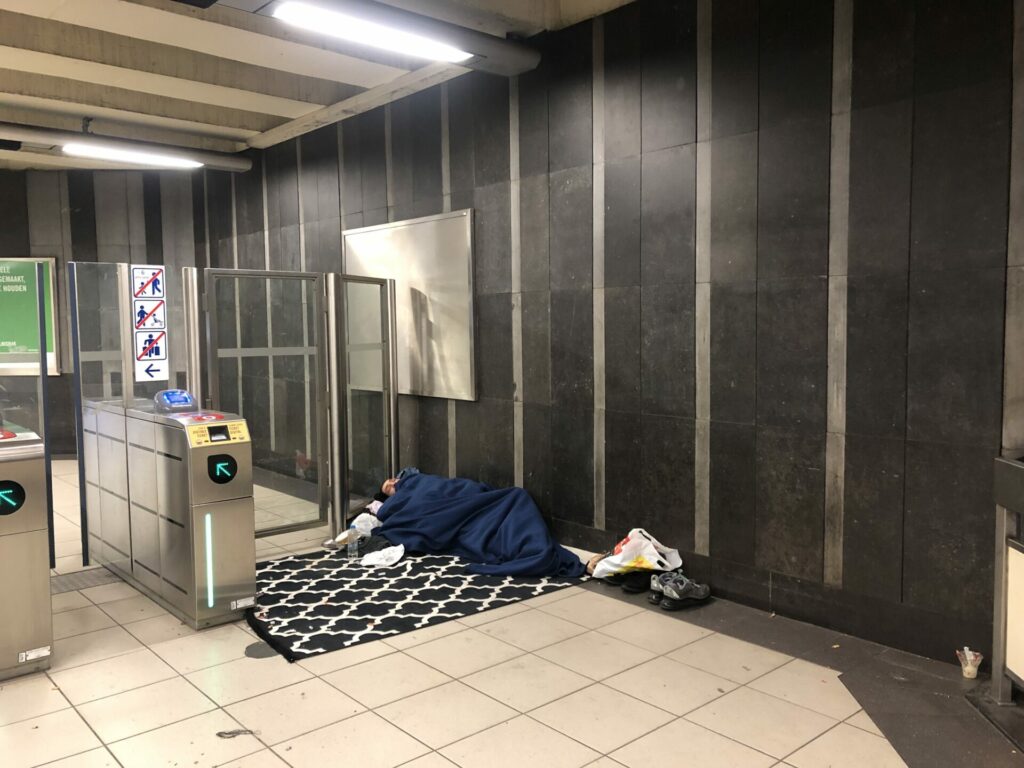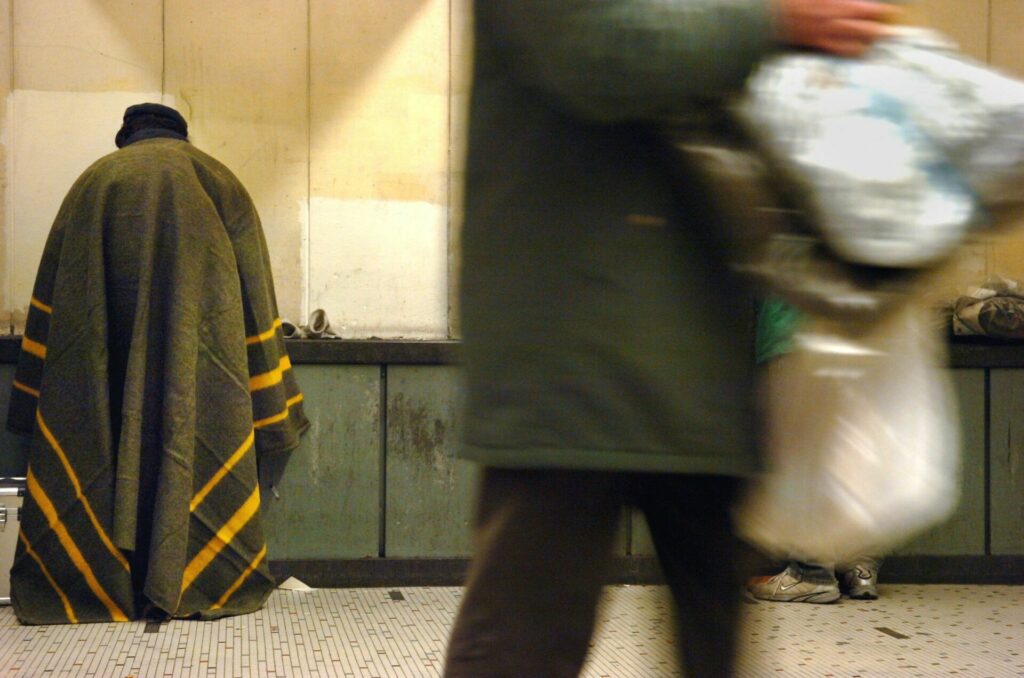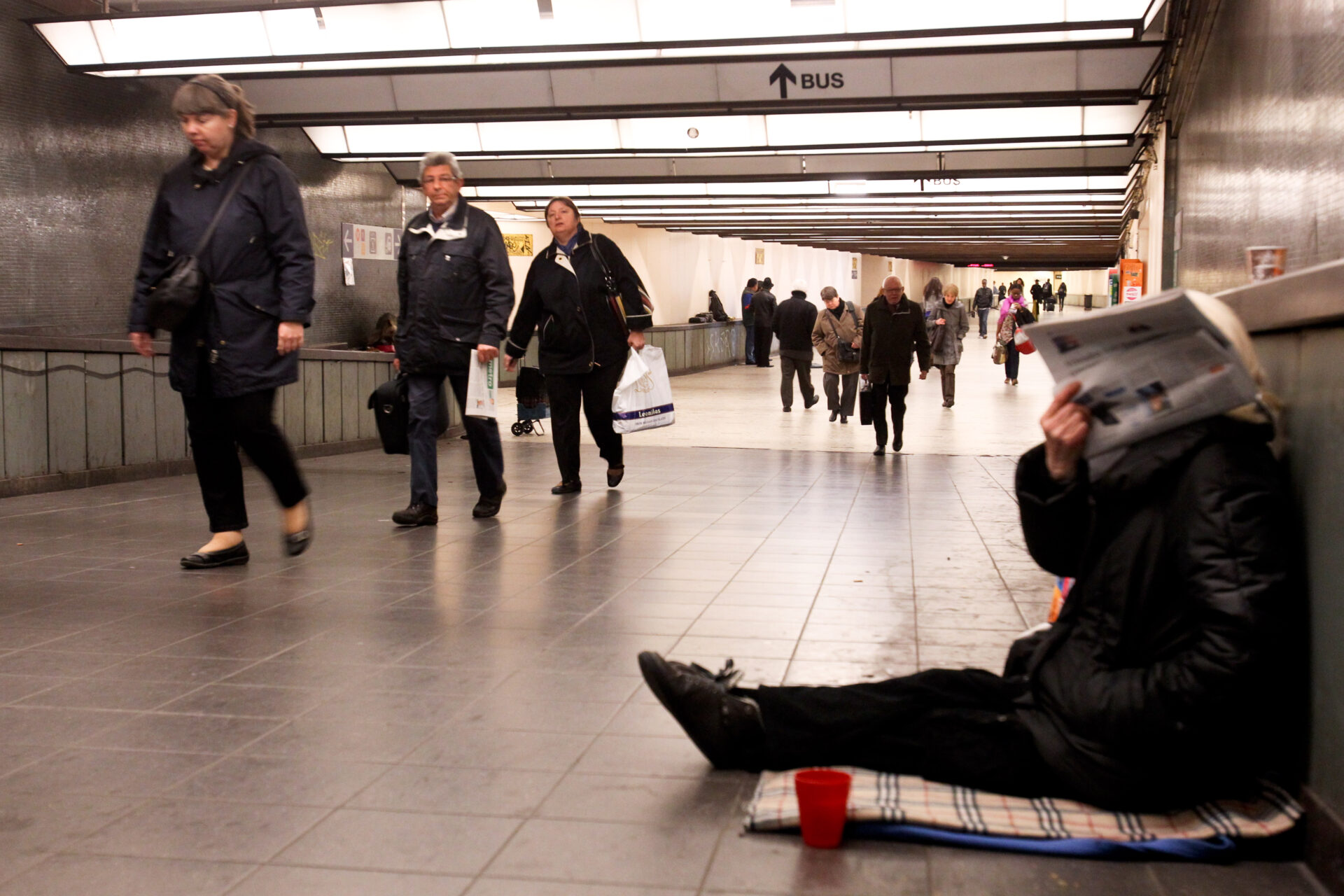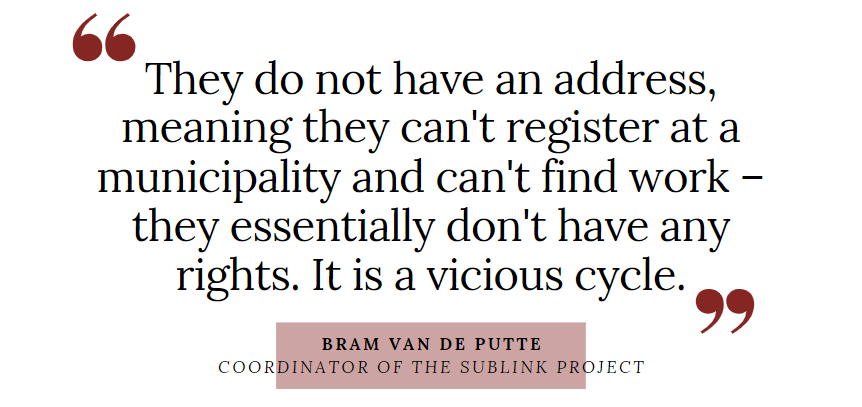Saying exactly how many people are living on the streets of Brussels is challenging, but it is clear that their number has gone up substantially in the last two years. Now, the Capital Region is trying out new ways to deal with the issue.
The number of homeless and poorly housed people changes constantly but the latest count by Bruss'help puts them at over 7,000 in the Belgian capital. Of those, more than 700 are sleeping rough – in metro or train stations, or on the streets.
SubLINK brings together four organisations dealing with homelessness and substance use (Samusocial, Diogenes, Lama and Transit) and combines short-term impact with structural solutions. The project – subsidised by the Brussels Government – was set up almost a year ago, when Brussels 'Extreme Cold' plan came to an end and homeless people were no longer allowed to stay in metro stations overnight.
"With SubLINK, we are following 865 people closely. Not all of them are homeless but they are 'tied to the streets' or in metro and train stations for reasons from begging to consuming drugs," Bram Van de Putte, coordinator of the SubLINK project, told The Brussels Times.
"Building bridges between society and people on the streets is central to our work. We coordinate between organisations, as well as between homeless people. All these smaller links make a very strong platform."

Homeless man in Comte de Flandre metro station. Credit: The Brussels Times
Roughly 40% of people who come into contact with SubLINK have mental health problems, often in combination with alcohol or drug addiction. About half of them do not have legal residence status and do not have access to benefits or other legal sources of income; almost 30% are begging.
"Many of them do not have an address, meaning they can't register at a municipality and can't find work – they essentially don't have any rights. It is a vicious cycle. We try to get them back into society by looking for temporary housing and a job."
People often assume that a homeless person's difficulties can be solved with a house, but Van de Putte stressed the long-term challenges: "Especially with people who have been on the street for years, a whole mechanism of change needs to be kickstarted before they are ready to accept housing."
Counting each individual
In half a year, SubLINK guided eight people who normally stay in metro stations overnight to a permanent address. "That doesn't sound like a lot in six months, but it is," Delphine Struyf, spokesperson for Diogenes, told The Brussels Times.
She stressed that in these cases a lasting solution has been found. "This is not an emergency solution. They really left the street." Struyf emphasised the "impressive" accomplishment of completing the whole process for eight people in just half a year. To get there many steps were required – from administrative appointments with local governments and welfare agencies to (mental) healthcare and social meetings.
Belgium's long waiting lists don't help matters. Simply securing a pre-hospitalisation visit with a doctor to arrange addiction care takes six weeks and then some more months before the hospitalisation can actually take place. Getting an appointment with a psychologist often takes months. Waiting lists for social housing take up to seven years. Single men sometimes even have to wait ten years.

Credit: Belga/Etienne Ansotte
"We work hard to motivate people to stop their substance use and make them regain confidence in themselves, so they can get help to reintegrate into society," said Van de Putte. "But when there is no reasonable solution, they often relapse. Six months is a long time."
A big part of SubLINK's work is handling these situations and trying to compensate for the fact that there is no housing, no psychological help and no hospital beds. "We have to maintain the link with them, so they don't have to do the work again and again," said Elise Boutirau, one of the project's streetworkers.
In six months, SubLINK's team carried out 3,670 interventions for 865 people. Of those, 487 are receiving more intensive psychosocial support such as analysing their situation, motivating people to change, setting up a support and care plan, and arranging and moving into accommodation.
Doctor's appointments and hotel rooms
The next step is to put individuals in touch with the right services by coordinating with a specific doctor, someone from a Public Centre for Social Welfare, or a lawyer in some cases. "We put them in touch with more general services so they don't only make progress within the homeless sector," said Van de Putte.
A recently launched pilot project now also gives SubLINK the option of arranging a stay in a hotel room for a few nights. But the option is used sparingly as placing someone in a hotel for a few days is not always the best solution if they have to go back to the streets afterwards.
So far however the project has yielded good results. "We set clear objectives and arrange one or more nights in a hotel before going to administrative or healthcare appointments, for example. While only a short-term solution, it has been working very well."
Boutirau gave the example of a woman who she had been in contact with for about three months. "One day I saw her and she was in really bad shape; she was mentally and physically completely exhausted compared to other times when I saw her." Emergency shelters were full, so Boutirau set her up in a hotel for a night.
"The aim was for her to 'get in shape' to go back to the streets. It may sound weird, but one night of respite can make a world of difference. And it did." Afterwards, the woman felt a lot better and was ready to take steps to limit her drug consumption.
No one-size-fits-all solution
While hotel stays are "a good tool" under the right circumstances, Van de Putte stressed that every case is different and requires personalised attention. "Still, there is no denying that we have seen good results."
In six months, SubLINK arranged a total of 325 nights for 60 people with a view to reaffiliation – with a success rate of 73%. Whilst acknowledging that efforts are needed elsewhere, Van de Putte is eager to highlight how helpful this method can be in the short term.
Despite the EU's recent commitment to end homelessness by 2030, the number of homeless people continues to rise, with the number of women, minors and elderly people among them increasing.
"There are as many reasons for being on the street as there are people on the street. Everybody has their own story," Van de Putte said. "We do what we can but I cannot stress enough the importance of investing in prevention to stop people from going to the streets in the first place."


